| Srl | Item |
| 1 |
ID:
176958
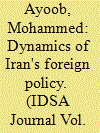

|
|
|
| 2 |
ID:
128908
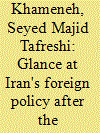

|
|
|
| 3 |
ID:
126909
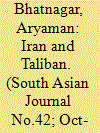

|
|
|
| 4 |
ID:
133166
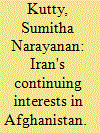

|
|
|
|
|
| Publication |
2014.
|
| Summary/Abstract |
As the year 2014 rolls on and the United States nears completion of its military drawdown in Afghanistan, its neighbors have no choice but to adjust to the quickly changing landscape. One of Afghanistan's most important-but largely understudied-neighbors is Iran. In the years that have passed since 9/11, it is often forgotten that Iran was an early supporter of the ensuing October 2001 invasion of Afghanistan. Tehran had long been wary of the Taliban and the raft of Sunni Islamist extremists it had aided and abetted. Tehran played an extremely constructive role during the Bonn Process, which produced Afghanistan's constitution including the emphasis upon democracy and support for the military invasion, Operation Enduring Freedom.
|
|
|
|
|
|
|
|
|
|
|
|
|
|
|
|
| 5 |
ID:
126926


|
|
|
| 6 |
ID:
133165
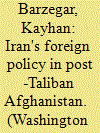

|
|
|
|
|
| Publication |
2014.
|
| Summary/Abstract |
Since the collapse of the Taliban regime in 2001, Iran has followed a two-pronged policy in Afghanistan: first, preserve stability and support the Afghan central government, and second, oppose the presence of foreign forces in the country. For Iran, Afghanistan is the focus point of its "Look to the East" grand strategy-which primarily seeks increased energy and economic relations between Iran and eastern countries in the Asia region, especially India, China, and Japan,1 and is the axis of its goal to establish stability in Southern and Central Asia. That is why, for the past 13 years, Iran has supported so many state-building efforts in post-Taliban Afghanistan.
|
|
|
|
|
|
|
|
|
|
|
|
|
|
|
|
| 7 |
ID:
176596
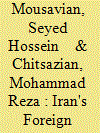

|
|
|
|
|
| Summary/Abstract |
Four decades after the Islamic revolution in Iran, when countries across the globe are grappling with the Covid‐19 pandemic, analyzing Iran's Middle East policy may seem eccentric. However, in the lead‐up to the U.S. presidential election and the end of Donald Trump's first term, the Middle East is drenched in chaos, instability and upheaval. The Israel‐Palestine conflict continues, and the Israeli government has declared it intends to annex part of the West Bank. Trump has formally recognized Jerusalem as the capital of Israel and Israel's annexation of the Golan Heights. Tehran no longer commits to the limits set by the nuclear deal, the Joint Comprehensive Plan of Action (JCPOA),∗ as long as the Trump administration pursues maximum pressure on Iran and a “No War, No Peace” strategy in the Middle East. In Iraq, tensions have escalated between the United States and Iran, fueling conflict while Baghdad lacks a strong and functional central government. Iran fired missiles in retaliation for the U.S. strike that killed General Qasem Soleimani, the commander of Iran's Quds Force, the external affairs branch of the Islamic Revolutionary Guard Corps (IRGC).
|
|
|
|
|
|
|
|
|
|
|
|
|
|
|
|